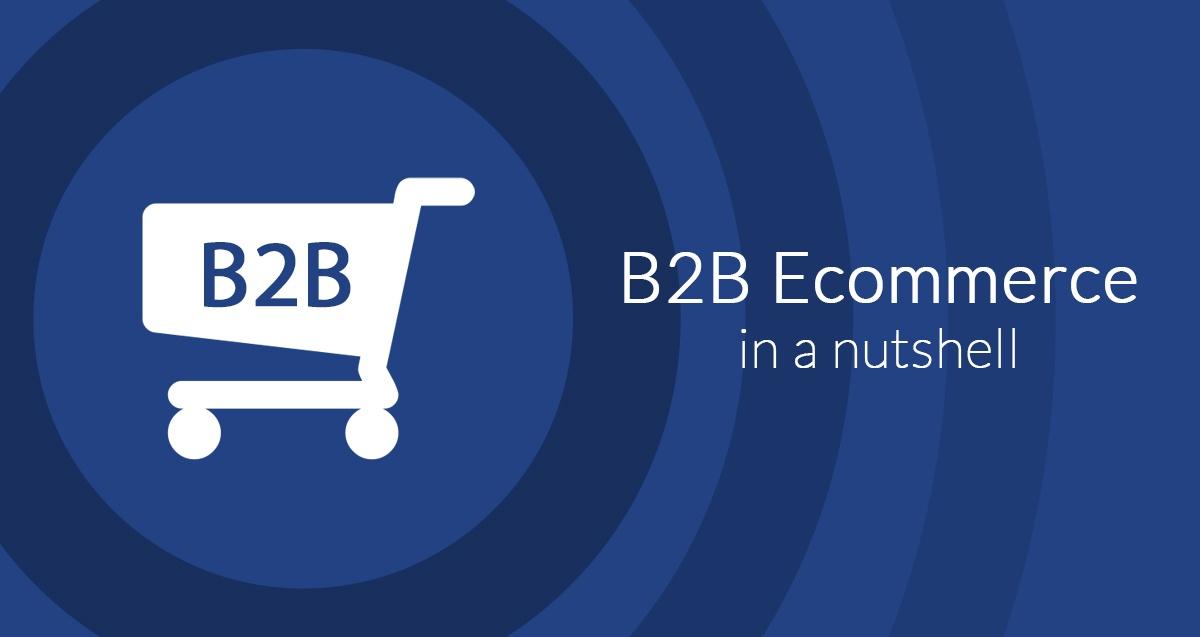B2B (business-to-business) describes companies that sell products or services to other businesses. However, classifying businesses as B2B isn’t always black-and-white. Many companies sell to consumers (B2C) and businesses (B2B). In this way, you don’t need to sell exclusively to one or another. Instead, B2B is simply one type of transaction that occurs between businesses.
We can further classify B2B into two types of transactions: traditional sales and ecommerce.
- Traditional Sales – transactions were done through the mail, over the phone, or in person. This put a lot of emphasis on salespeople, who must track down prospects, following up with leads, and close deals, and customer service teams who must (accurately) process orders.
- B2B Ecommerce – internet-empowered B2B ecommerce came along and changed everything. B2B ecommerce is a broad term encompassing any online transaction from one business to another. Using advanced website technology and integrations, much of the sales process can now be automated. With a powerful B2B ecommerce platform, leads can self-service even complicated transactions involving group-specific pricing, customized products, or bulk purchases. This enables employees to focus on higher value activities.
B2C vs. B2B Ecommerce: Key Differences
As you can imagine, B2B ecommerce tends to be more complicated than B2C. Rather than selling a small number of products to individual consumers for a fixed price, B2B companies sell a large number of products to businesses at variable prices. This is why B2B represents a much larger gross total revenue – and requires much more powerful and nuanced ecommerce systems – than B2C.
Many factors contribute to success in B2B ecommerce. For starters, by updating your site with the latest technology, you can streamline the shopping experience, automate essential processes, increase security, and integrate your existing ERP and CRM software systems. And, as you’ll see in this article, custom B2B ecommerce solutions and functionality can meet specific business needs to improve practically every aspect of the sales process.
Examples of B2B Ecommerce
Next we’ll review examples of how B2B ecommerce isn’t just a different type of transaction – but a new sales platform that can streamline the sales process and get your products in front of new and expanded audiences.
How Does B2B Ecommerce Meet Complex Business Needs?
Even though B2B ecommerce has a lot more moving pieces than B2C, buyers still expect a shopping experience similar to the ease and accessibility of a B2C marketplace. Creating a streamlined B2B shopping experience requires meeting complex business needs – such as negotiated pricing, bulk purchases, product variations, product customization, and more.
The goal of a modern ecommerce solution is to overcome those challenges as gracefully as possible, automating the sections of the buying process and saving time for buyers and employees. This can be achieved with a custom B2B ecommerce solution, including the following capabilities:
- Show different products to each buyer
- Display different prices based on buyer circumstances
- Include mechanisms to negotiate prices
- Allow buyers to customize products on-the-fly
- Include mechanisms to request and customize products that aren’t in stock
Providing all of this functionality manually via a support or sales team would require a lot of time and resources. Luckily, the latest B2B ecommerce systems can handle all of this and more. Following is an overview of how a custom B2B ecommerce system can meet complex business requirements.
What’s an Example of B2B ecommerce in a Real-World Application?
AccuStandard, Inc., is a leading manufacturer of chemical reference standards. Our team helped them transition to a B2B ecommerce website to overcome market challenges and create a streamlined shopping experience for their buyers. This transition involved upgrading their Magento 1 Open Source site to a Magento 2 Commerce site – complete with ERP integration and a robust customer portal.
Beyond streamlining the shopping experience for their buyers, their B2B ecommerce website had to accommodate AccuStandard’s unique pricing requirements, allow purchase restrictions based on geography and customer type, and provide a custom interface. Here’s an overview of the most pressing business challenges and requirements that their ecommerce system needed to accommodate:
- Large Inventory: AccuStandard sells over 30,000 chemical products, and continually adds new products.
- International Reach: In selling to upwards of 18,000 buyers around the world, various unique restrictions must be applied based on location and customer status.
- Pricing Specifications: AccuStandard organizes pricing into over 25 customer groups, each with 10 price tiers.
- ERP Integrations: A crucial business need is having a seamless, bidirectional integration between the ecommerce site and their highly-customized FileMaker ERP.
- Advanced UI: Dynamic forms, customized user portals, and quick-order options streamline the shopping experience for different types of buyers.
- Modern User Experience: Finally, the AccuStandard site needed a sleek user-facing experience with expanded account capabilities.
We developed a Magento 2 Commerce site tailored to AccuStandard’s business needs and optimized for a unique workflow. The website meets pressing challenges by implementing AWS Global hosting, a clustered database, IP-based location filtering, FileMaker integration, and more.
Here’s an overview of the digital storefront they now use:
- Robust Customer Portal: The site includes a customer portal that recognizes multiple access levels and provides user-specific reports. This includes recognizing multiple buyers or departments within the same business. Notably, the secure portal lets customers (distributors) access customized reports and collateral materials.
- Advanced Order Options: The ecommerce system provides advanced order options, such as the ability to upload orders via an Excel sheet or by using catalog numbers. Users can also request custom-formulated products and literature.
- User Access Controls: The system implements tight user access controls for placing orders, creating requisition lists, and downloading specific documents. This includes advanced security and sign-in requirements related to shopping, sharing saved items, and accessing documents.
- Complex Buyer Permission Rules: AccuStandard’s site follows strict purchasing rules based on location, product type, user level, and legal restrictions.
- Custom Buyer Pricing Rules: The site accommodates AccuStandard’s grouped and tiered pricing structure. Each B2B buyer is confirmed and then assigned to the correct spot in the tiered pricing structure.
- FileMaker & Magento Integration: A custom, bidirectional integration was developed to sync data between their FileMaker ERP system and the Magento 2 Commerce site, continuously and in real-time.
AccuStandard’s ecommerce site also includes features for continued growth, such as giving site administrators the ability to update the site without programmers, leveraging Magento Commerce features to make it easier to build orders or locate items, and much more. The company’s investment in this B2B ecommerce solution automates previously manual parts of the sales process, gives buyers a more streamlined shopping experience, converts more leads, and helps their team operate more efficiently moving forward. Since the Magento 1 site launched in 2016 and the Magento 2 site re-launched in 2020, Harris Web Works and AccuStandard have enjoyed a successful collaboration, which you can read more about here.
September 24, 2020
All Articles




